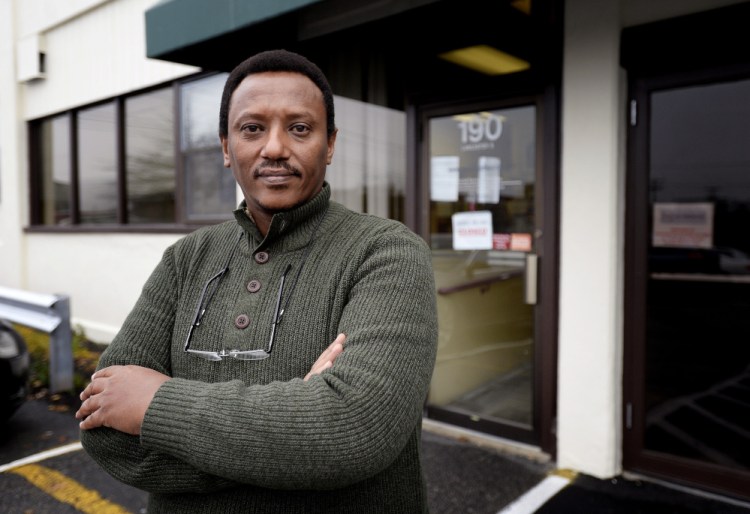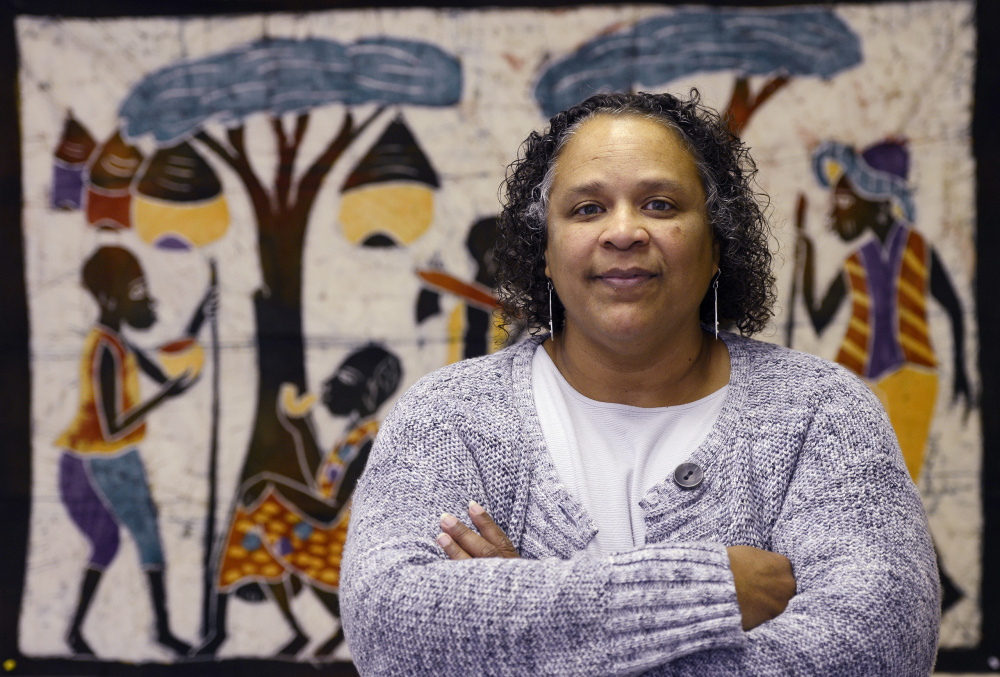Jean Paul Ruzibiza said he was hiding in the ceiling of his home in sub-Saharan Africa when the police came for him.
Because he was an activist helping children as young as 9 avoid joining or escape the army during the civil war, he said, police in Burundi wanted to silence and intimidate him – or even worse.
Suspecting he was hiding in his otherwise empty home, police lobbed some tear gas or pepper spray cannisters into his home, he said. He began to choke and cough. They began shooting. Blood dripping from his wounded leg gave away his position, so he surrendered.
What followed was days of torture and even a sexual assault, he said. They cut his thumbs with pruning shears and clipped his ears with scissors. They repeatedly beat him with the butts of their weapons, he said.
“I thought: This is my last chance, or I will die,” said Ruzibiza, adding that he was under near-constant surveillance. “I sold everything I had and paid the corrupt police and the corrupt intelligence agencies.”
After bribing his way out of incarceration, Ruzibiza said he secured a visa to enter the United States in 2011. The next year he arrived in Portland, where he became one of hundreds of refugees and asylum seekers – many from Burundi and other sub-Saharan African nations – to be helped by the city’s Refugee Services Program.
Now, the 50-year-old could be one of the last torture survivors to be successfully helped through the city’s refugee office.
Portland has lost two crucial grants supporting its refugee program in the last six months. Officials expect to lose another state grant when it expires next year, leaving them scrambling to provide what advocates say is a much-needed service.
“When I think about support services being cut, that is just devastating. If anything we need to add to those,” said the Rev. Allen Ewing-Merrill, co-pastor of the HopeGateWay church, which advocates on behalf of and provides assistance to asylum-seeking immigrants. “One hundred percent of refugees and asylum seekers coming to Portland that I work with are dealing with trauma. They’re fleeing because of violence, near loss of life, witnessing family members brutally murdered and threats on their own lives. Every single one of them has post-traumatic stress disorder.”
The loss of the funding comes as the debate over immigration – particularly of refugees and asylum-seeking immigrants from war-torn lands – is becoming increasingly acerbic, with some elected officials, including Gov. Paul LePage, opposing Syrian refugees out of fear some could be terrorists in hiding, while Donald Trump, who is pursuing the Republican presidential nomination, is advocating prohibiting Muslims from entering the U.S.
CITY TAKES ‘A REALLY BIG HIT’
Portland has long welcomed refugees and immigrants, applauding the diversity and industriousness they bring to Maine’s largest city. In June, it joined the International Campaign for Compassionate Cities, which affirms a community’s openness to all people, and also created a locally funded emergency assistance program to help asylum-seeking immigrants when state funding was under threat.
The city has received a federal Survivors of Torture Grant from the U.S. Office of Refugee Resettlement since 2009, according to Regina Phillips, the city’s refugee program coordinator. The two three-year grants provided more than $360,000 a year, or about $2.2 million in total, she said, and helped fund case managers for the city as well as for nonprofit partners such as Catholic Charities, Maine Behavioral Health Services and Tri-County Mental Health Services in Lewiston.
It’s the largest of the three grants that make up almost all of the Refugee Services Program’s $352,000 budget, for which the city provides only $66,000 in funding.
But on Sept. 30, the city was informed that the grant was not renewed.
“We’ve taken a really big hit,” said Phillips. “These services are vital to new Mainers who are coming into the city.”
The federal agency awards $11 million a year to more than 30 agencies nationwide to assist survivors of torture.
The city’s application scored an 85 out of a possible 100 points. According to a federal review sent with the denial letter, the application lost points for lacking specifics about the immigrant populations that have suffered torture, the need for professional training, the assessment process, how it would manage waiting lists, and a lack of program evaluation.
The torture survivors grant is unique, because it is one of the few federal funding sources that can be used to assist asylum-seeking immigrants who have been detained and tortured by a governmental agency. It provided mental health counselors (individualized and group sessions) and case managers, who can connect clients otherwise ineligible for federally funded programs to a range of other services – from General Assistance, to housing services, medical treatment, legal assistance, English language classes and job training. The funds are also used to provide workshops on assimilating into American culture and basic tips for surviving Maine winters.
Until September, the grant was used to provide services to 277 households – 243 in Portland and 34 in Lewiston. Phillips said over the last three years, 300 torture survivors have been provided services and many more have been assessed. Of those served, 100 survivors were discharged, she said, meaning they no longer needed the services.
“It’s been pretty successful,” she said.
Phillips said people seeking refugee services previously funded by the grants are being referred to the Portland Community Health Clinic, which may be able to provide counseling and health services. But other case management services are more difficult to find, she said.
“There isn’t any other place that will do counseling and case management at the same time,” she said.
In addition to losing the federal torture survivors grant, the city also lost a $53,751 Social Services Block Grant from Catholic Charities, which was used to provide assistance to 11 households, totaling 42 individuals, for services similar to those funded by the federal grant. But unlike the federal grant, the money provided by Catholic Charities may only be used to help primary refugees and secondary migrants, not asylum seekers.
Secondary migrants are refugees who were resettled in another community before coming to Maine, while primary refugees are those who are settled here from the beginning.
Bonnie Bagley, associate director of Catholic Charities, the lead organization on refugee resettlement in Maine, said the nonprofit group decided not to award the grant to the city because there has been a drop in the number of secondary migrants, who were typically helped by the city, and an increase in primary refugees, who are typically helped by the nonprofit.
“It made more sense to keep the funds in house,” Bagley said.
Meanwhile, the city expects to lose a $175,000 state Targeted Assistance Grant when it expires next September, according to Dawn Stiles, the city’s director of health and human services.
CLIENT BACK ON HIS FEET
Ruzibiza said the services he received through the city’s refugee office were crucial. Physically bruised and emotionally beaten down, he attempted suicide while being held in a Buffalo, New York, detention center after trying to cross the border into Canada, where he hoped to be welcomed as a French-speaking immigrant. In Portland, city officials connected him to doctors who treated his physical wounds, and mental health counselors who helped mend his emotional trauma. He was provided with housing assistance after spending three months in the city’s homeless shelter. He was granted access to education and job training opportunities.
Now he said he earns a steady paycheck as an interpreter and is able to pay his own rent and purchase his own clothes. Last year, he began taking classes at Southern Maine Community College.
“I am very happy now, because I can pay my own bills,” he said. “It is to be a man again. It is to be a human again.”
Through the city’s refugee office, he was also able to keep tabs on and stay in contact with his family, who remain in a refugee camp in Uganda.
Though he said he was granted a federal green card through a lottery, his application for asylum is still pending in court. He said he looks forward to the day when his wife and five children, whose ages range from 15 to 23, can join him in Portland.
Phillips said she is currently working to secure other funding sources to bring back the programs.
But Ruzibiza said he is concerned about other refugees and asylum seekers who still need help.
“Many people are in need right now,” he said. “People don’t know what to do. People are very, very confused.”
Send questions/comments to the editors.





Success. Please wait for the page to reload. If the page does not reload within 5 seconds, please refresh the page.
Enter your email and password to access comments.
Hi, to comment on stories you must . This profile is in addition to your subscription and website login.
Already have a commenting profile? .
Invalid username/password.
Please check your email to confirm and complete your registration.
Only subscribers are eligible to post comments. Please subscribe or login first for digital access. Here’s why.
Use the form below to reset your password. When you've submitted your account email, we will send an email with a reset code.